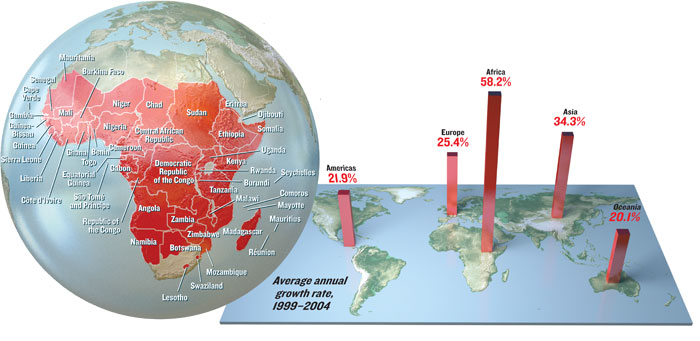
U.S. companies had actually been falling behind. "Sub-Saharan Africa has enjoyed nearly 6 percent annual economic growth for the past decade. And the robust expansion is expected to endure through the decade. Ernst & Young calls Africa the world's second-most attractive market for investment behind North America. Yet as Africa gains momentum, U.S. business activity there has all but stalled. U.S. direct investment in Africa essentially flat-lined between 2010 and 2012....Over the same period, China...and the European Union...poured money into a region they see as rich with natural resources and economic potential. U.S. corporate profits in Africa fell in 2013 for a second straight year." Paul Wiseman in the Associated Press.
Summit ends with U.S. challenging Chinese edge in Africa. "Obama’s administration sought to use the U.S.-Africa Leaders Summit that ended in Washington yesterday as a way to spur investment in a continent that holds some of the richest mineral deposits, fastest-growing economies and a burgeoning middle class. While China has stolen a march on the U.S., with its trade with Africa surpassing $200 billion last year — more than double that of the U.S. — contrasting investment styles mean American businesses have the potential to profit....Leaders of more than 40 African countries, business executives and U.S. officials pledged to renew efforts to boost investment." Brian Wingfield and Chris Spillane in Bloomberg.
Long read: U.S. moves to cash in on Africa's promise. Don Lee in the Los Angeles Times.
Africa's growing energy needs test climate-change policy. "Some of the electricity needed...would come from fossil fuels such as natural gas, which Africa has a lot of. Some of it could be through renewable energy...in the form of mini-grids that can exist apart from the main electric grid. Improving energy efficiency will also play a key role....Initiatives the Obama administration has launched to bolster energy and electricity in Africa incorporate renewable and natural gas generation. Legislation in the House and the Senate would set guidelines for improving electricity access and development in Africa. Investors...are bullish on the continent's renewable energy potential. But as African nations continue to grow and demand more electricity, nations that currently provide a bulk of greenhouse gas emissions will have to cut even further." Zack Colman in the Washington Examiner.


No comments:
Post a Comment